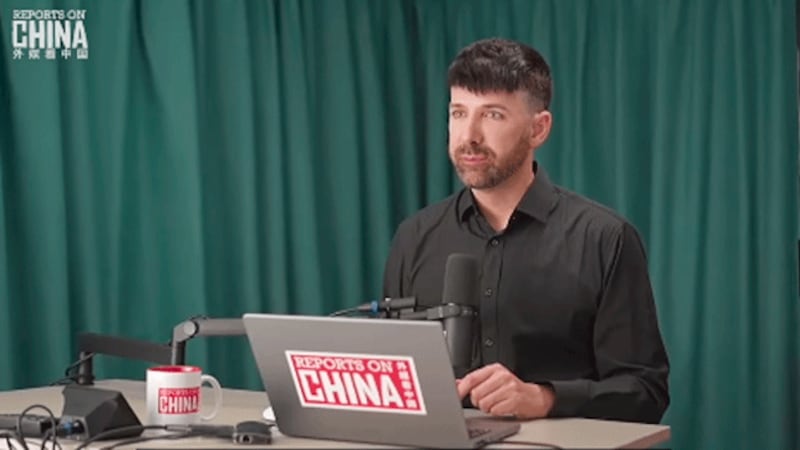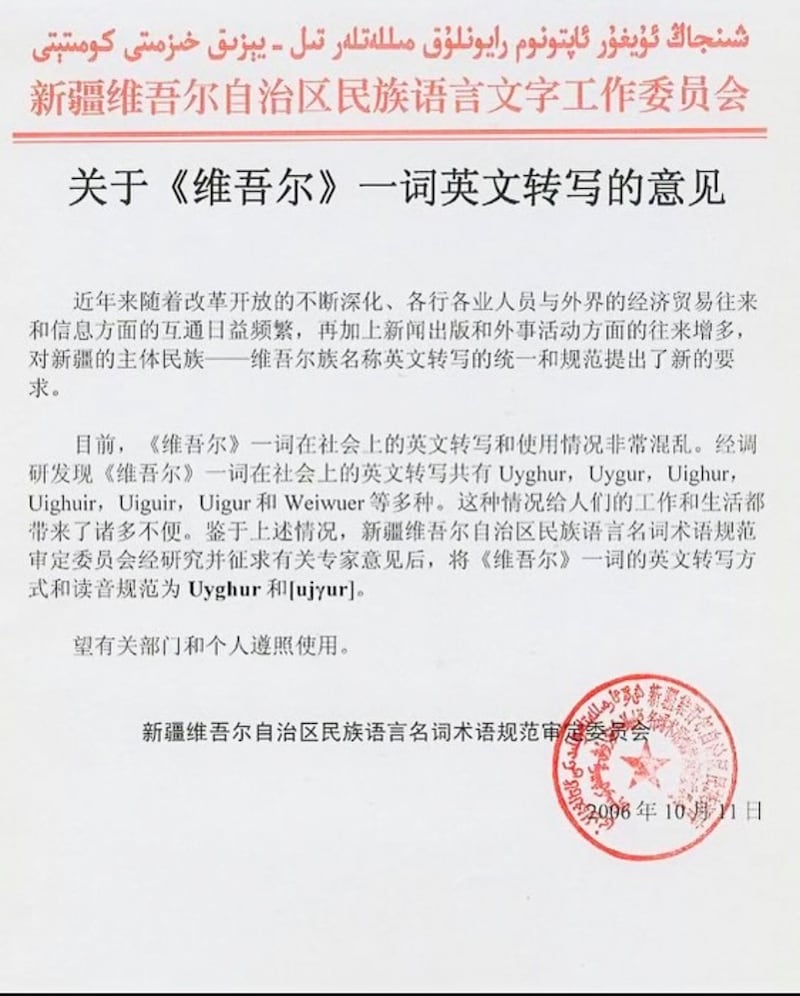[ Read RFA’s coverage of this topic in Uyghur. Opens in new window ]
Recently, a China-based New Zealander who's a columnist for the Shanghai Daily generated a stir when he declared on X that "Uyghur" — referring to the 12 million-strong ethnic group living in northwestern China — should be spelled in English without an "h."
Andy Boreham, who has a history of using his social media platforms to propagate Beijing’s political messages, says the word should be spelled “Uygur,” per a Chinese government directive back in 2012.
This upset linguists and Uyghur advocates alike, who said the alternative spelling was incorrect, ignored Uyghurs’ preference and played into Beijing’s attempts to divide the Uyghur people.
Boreham, whose Chinese name is An Boran, said that the use of “Uyghur” with an “h” would be banned on all social media platforms or websites published in China. “The central government has ordered it, so it must be followed,” he wrote in the Sept. 6 post.
Who are the Uyghurs?
The Uyghurs are a Turkic, mostly Muslim ethnic group living in what is today the Xinjiang Uyghur Autonomous Region of northwestern China — which Uyghurs prefer to call East Turkestan.
They trace their roots in the region back centuries. The term “Uyghur” first appears on inscriptions on standing stones in present-day Mongolia dated to the 7th century.

In recent decades, the Uyghurs have been subjected to oppression and human rights abuses by the Chinese government that the United States and other Western governments have labeled a genocide.
Since 2017, an estimated 1.8 million have been herded into concentration camps, and thousands have been imprisoned. China says the facilities are job training sites to provide skills and alleviate poverty, and that most of the camps have been shut down.
Why is this alternative spelling a big deal to Uyghurs?
Members of the mostly Muslim ethnic group overwhelmingly prefer the spelling "Uyghur" because it more closely approximates the proper orthography and pronunciation in their native language.
To propose another spelling is disrespectful — and promotes division within the Uyghur community, they say.
“A white colonialist who works for another colonial empire is trying to tell us Uyghurs how to write and read our own national name. Who does he think he is?” said Dilnur Reyhan, president of the Paris-based European Uyghur Institute.
Boreham’s assertion may seem small, but it employs a familiar tactic from the Chinese government’s playbook — to sow division, said Ilshat Hassan Kokbore, vice chairman at the World Uyghur Congress.
By trying to get some Uyghurs to embrace the spelling “Uygur” without the “h,” China wants to create a version of Uyghurs who are members of the big China family, he said, separate from other Uyghurs.
This approach aligns with China’s long-standing political slogan: “Break their roots, break their connections, and break their origin,” he said.

Similarly, China has also replaced “Tibet” in official documents with “Xizang.”
Hassan said that having two spellings would cause confusion in online searches and could hinder access to important information.
“The risk is that we could lose parts of Uyghur history, literature, traditions, and even the ongoing Uyghur genocide in these searches,” he said.
How has this name been rendered over time?
“Uyghur” contains sounds that aren’t easily rendered in English. When spoken, it sounds closer to “oy-gher” than “wee-ger,” as most Westerners enunciate it.
One early original source in English for the history of the region, British explorer T. D. Forsyth’s “Report of a Mission to Yarkand in 1873,” refers to the “Uighur” people. Other early spellings include “Ouighour” and “Ouigour,” derived from French and German scholars' renderings.
What is the basis for Boreham’s assertion?
Previously, China had included an “h” in the English spelling. An official directive issued on Oct. 11, 2006, from the Committee for the Language and Writing of the People’s Republic of China used “Uyghur.”
But on May 15, 2012, the China Daily, the English-language newspaper owned by the Chinese Communist Party, reported that the word had been officially standardized as "Uygur."
Since then, official Chinese websites, including those of the Xinjiang Uyghur Autonomous Region People's Government and Chinese embassies in the United States and Europe, have used the "Uygur" spelling.
What do experts say?
Scholars and experts on the region rejected the latest call for a spelling change.
The word “Uyghur” is one of the most commonly used terms in Turkology in the Western world, and it is also used to refer to the script known today as Old Uyghur, they say.
Similar terms, like “Afghanistan” or “Mughal Empire” are often rendered with “gh” in Western languages because the “gh” sound does not exist in English. This is why Boreham’s suggestion to remove the “h” from the English form of “Uyghur” has been widely criticized.
Timothy Grose, a professor of China studies who is an expert in ethnicity and ethnic policy in China at Rose-Hulman Institute of Technology in Indiana, said Boreham’s dictum was “completely wrong.”
“The sound here is closer to ‘gh,’ so it is most accurately expressed with that spelling,” he said.
“It neglects that Uyghurs themselves have their own culture and their own language, and it is really the duty and obligation of others to see this language and culture for its itself and on its own terms,” he said.
Translated by RFA Uyghur. Edited by Roseanne Gerin and Malcolm Foster.
